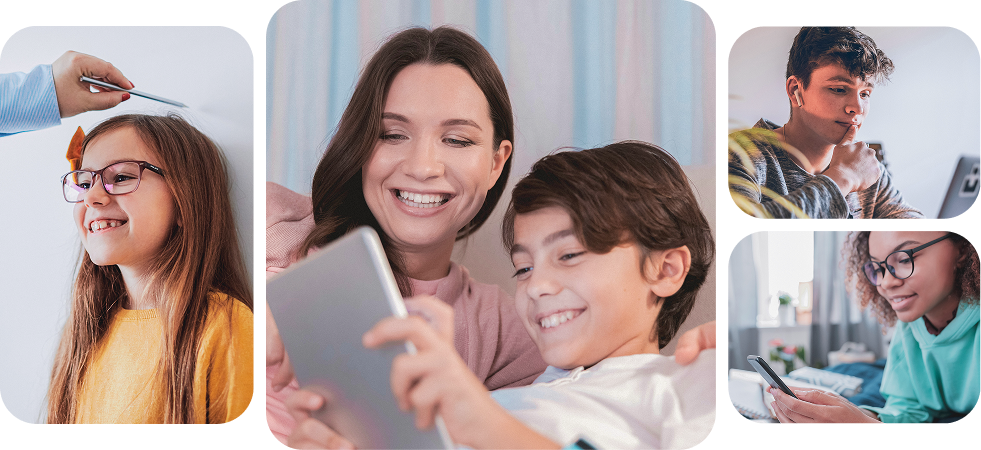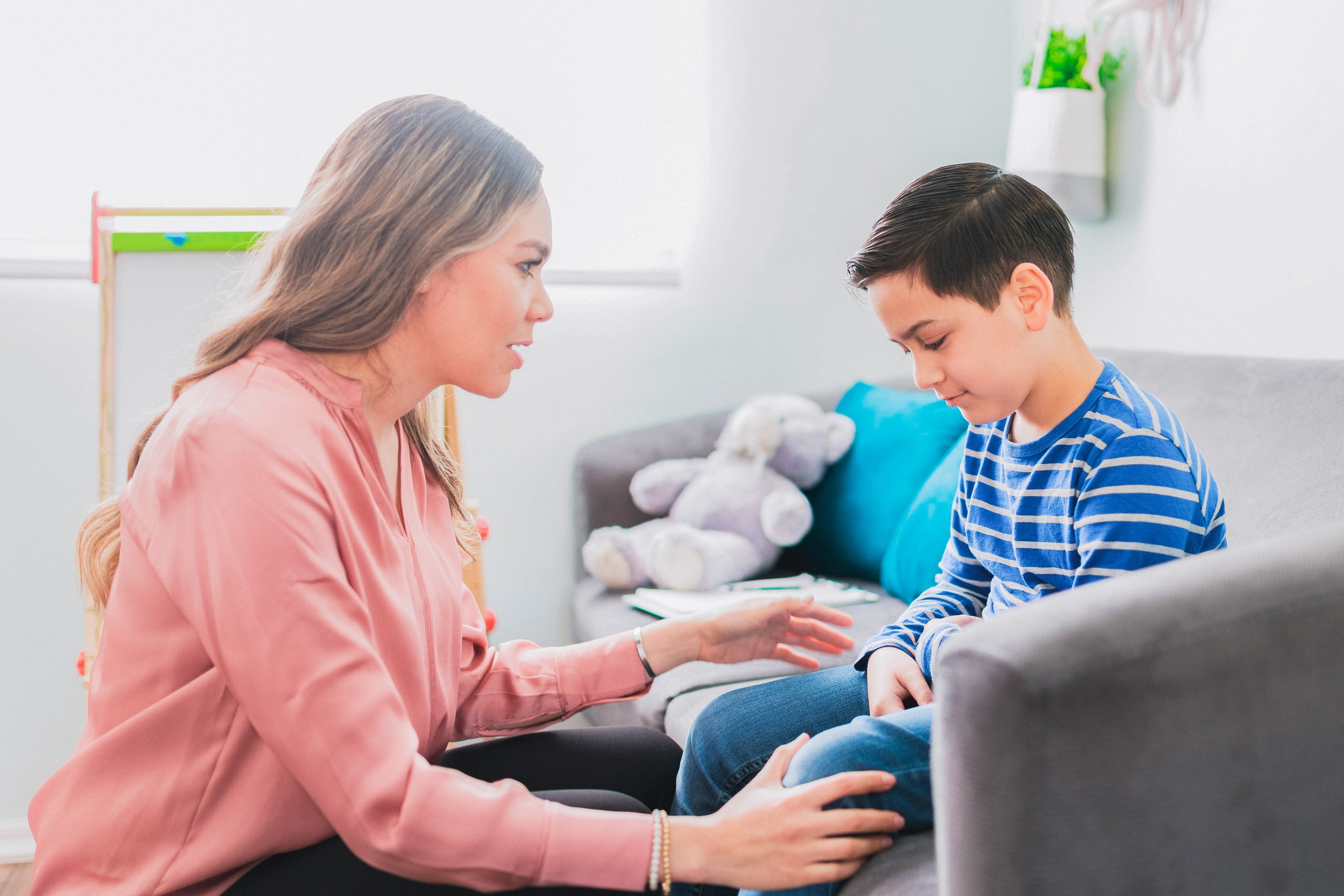The Best Online Therapy Services for Kids
Discover top online therapy services for kids with our comprehensive reviews. Find the right fit for your child's mental health needs!



Kids and teens today face more mental health challenges than their parents and grandparents did, often fueled by modern pressures like social media, academic stress, and constant connectivity.
Fortunately, today’s world also offers modern solutions. Online therapy for kids has become a practical, stigma-free way for young people to access quality mental health care from home, offering convenience, flexibility, and access to specialized mental health professionals.
This guide highlights the best online therapy services for kids and helps you choose the right match for your family.
Key takeaways
- Online therapy is just as effective as traditional in-person therapy for most children and teens.
- Kids and teens may engage better in online therapy, where familiar surroundings reduce anxiety, remove stigma, and make it easier to open up.
- Online therapy platforms differ in age range, specialization, and features, so it’s important to find one that best fits your child’s unique needs.
Why choose online therapy for kids?
In the U.S., as many as 80% of children and teens don’t receive the mental health treatment they need. Online therapy provides care that’s just as effective as in-person therapy, while removing many barriers to access.
One major advantage is accessibility. Sessions can happen right at home, eliminating travel time and opening care to families in remote areas. Flexible scheduling, including evening or weekend appointments, also helps busy parents fit therapy into daily life.
Children often feel more at ease in their own environment, which can help them open up more easily. For therapists, meeting children virtually offers valuable insight into their home environments and parent-child relationships, enabling practical, real-time guidance.
Online therapy offers a layer of privacy that encourages more families to seek help. Teens in particular may prefer the privacy and reduced stigma of online counseling, finding it easier to talk through a screen than face-to-face.
That said, online therapy isn’t without challenges. Technical issues, such as poor internet or background noise, can disrupt sessions, and younger or very young children may struggle to stay engaged without in-person interaction. Privacy can also be tricky in shared spaces, and teens may worry about confidentiality.
Therapists might miss subtle nonverbal cues (which are often easier to spot in in-person sessions) that can make emotional assessment harder. Still, with the right setup and an experienced child’s therapist, the benefits usually outweigh the drawbacks for most families.
How we selected the best online therapy platforms for kids
We reviewed leading online therapy platforms designed specifically for children, teens, and families. Each was evaluated for:
- Platform features: Ease of use, flexible scheduling, multiple communication options, and tools like therapist matching.
- Therapist credentials: Licensed, certified, and trained in child and teen therapy, with rigorous vetting.
- Therapeutic approaches: Evidence-based methods such as cognitive-behavioral therapy (CBT), dialectical behavior therapy (DBT), parent-child interaction therapy (PCIT), and play therapy, plus options for group or family therapy.
- Cost and insurance: Transparent pricing, insurance coverage, and overall affordability.
- Parental involvement: Parent engagement through updates, coaching, or family therapy sessions, while respecting teen privacy.
- Security and HIPAA compliance: HIPAA-compliant systems, encrypted technology, and strict confidentiality.
- Age focus: Services tailored for younger children, teens, or both, with age-appropriate approaches.
Quick comparison: Top online therapy services at a glance
Below is a quick side-by-side comparison of leading online therapy platforms for kids.
Note: Pricing, age ranges and insurance coverage may vary by state, provider and individual insurance plan, please check directly with the platform or your insurance.
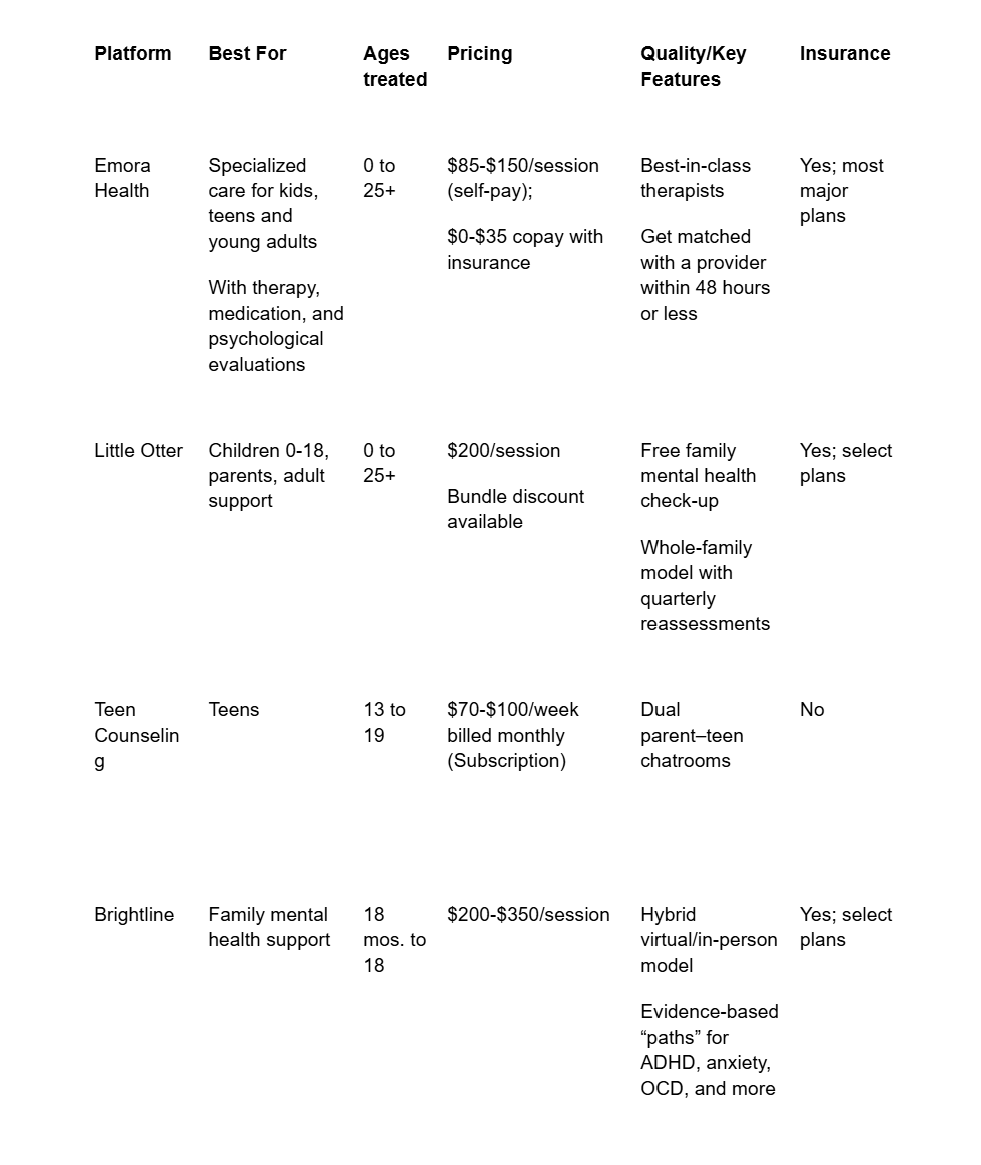
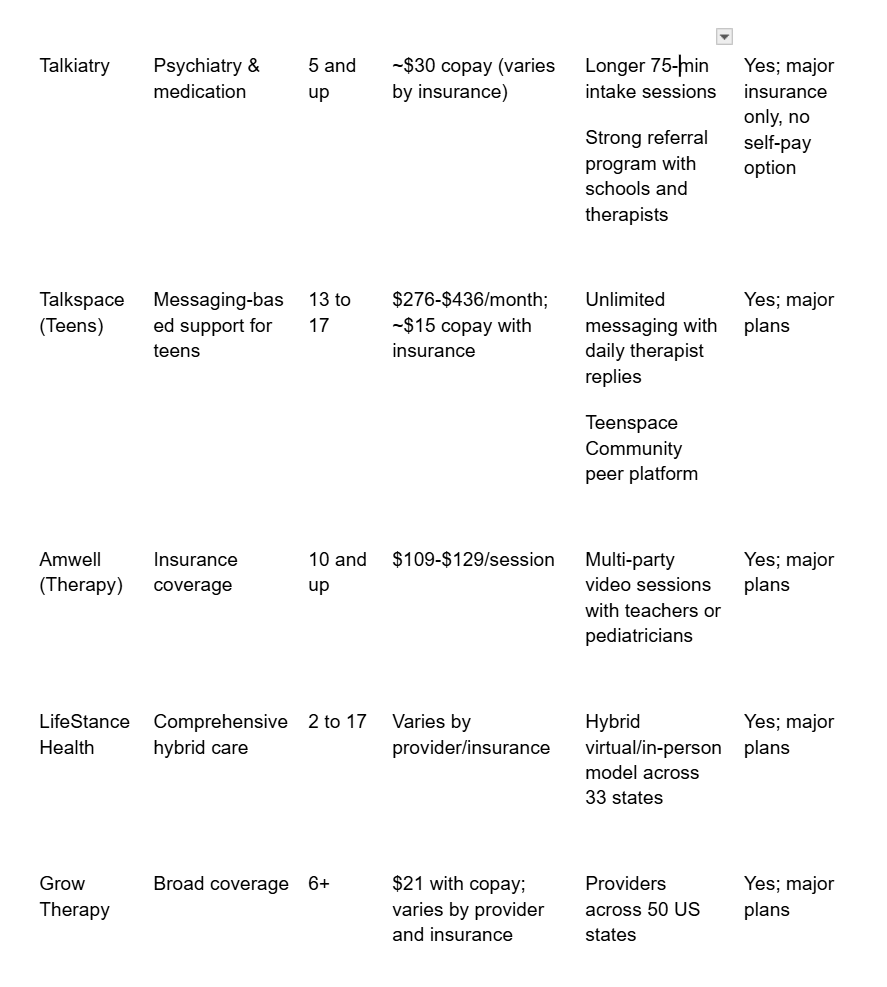
Detailed review of the best online therapy services for kids

Here’s a closer look at the top online therapy platforms: what they offer, who they’re best for, and what families can expect in terms of features, pricing, and access.
Best Overall: Emora Health
Emora Health makes it easy for families to get all their child’s mental health services in one place. Its youth-centered model combines therapy, medication management, and diagnostic testing, so parents don’t need to juggle multiple providers.
Sessions take place via secure video or messaging, and appointments are often available within 48 hours. Families can either choose a therapist or get matched with one who fits their child’s needs.
Emora hires only about 5% of applicants and employs psychologists, psychiatrists, and licensed therapists trained in evidence-based methods like CBT, DBT, and PCIT. The platform treats over 100 mental health conditions and offers evening and weekend options.
Its care dashboard keeps everything organized, while real-time insurance coverage checks that remove billing surprises.
Age range: 0–25+ years
Privacy and security: Fully HIPAA-compliant with encrypted video sessions and required parental consent for minors.
Pricing: In-network with most major insurance providers; typical copay $0–$35 per session. Sessions at $85–$125
Pros:
- Integrated therapy, psychiatry, and diagnostic testing
- Highly selective hiring (-5% acceptance)
- Fast access and strong family collaboration
Con:
- Available only in select states for now
What real clients are saying about Emora Health
5-star rating from a parent of a 12-year old: “Dr. Narcona was delightful and professional. She made space for my son to express himself but accepted his silences also. She made all of us feel very comfortable and let Him know his secrets are safe and that there is nothing wrong with him - we are just trying to help him be confident and thriving.”
5-star rating from a parent of a 5-year old: “This was great! My daughter is able to receive the support she needs to succeed. Katie set up a clear and concise game plan for my daughter including some great tips for medication taking.”
Best for younger kids & families: Little Otter Online Therapy
Little Otter focuses on early child mental health, supporting younger kids and their parents through a whole-family approach. Every family starts with a free family mental health checkup, a proprietary assessment that identifies each child’s needs before treatment begins.
Care may include play therapy, parent coaching, and family therapy, led by psychologists, psychiatrists, and mental health professionals trained by Dr. Helen Egger’s (founder) team.
Sessions occur via secure video, and families can message providers, view notes, and track progress through the app. Quarterly check-ins measure progress so parents can adjust care as needed.
Age range: 0–25+ years
Privacy and security: HIPAA-compliant with encrypted video sessions and required parental consent for minors.
Pricing: Therapy and parent-coaching sessions $200. Bundle discounts available. In-network with select plans. HSA/FSA eligible.
Pros:
- Whole-family focus supporting parents and kids together
- Measurement-based care with quarterly assessments
Con:
- Limited options for older teens
Best for teens: Teen Counseling (BetterHelp)
Teen Counseling makes online counseling feel natural for teens who live online. The platform offers video, phone, chat, and unlimited text messaging, giving teens multiple ways to connect comfortably.
More than 9,000 therapists specialize in adolescent therapy, each with at least three years of experience. Its dual-interface system keeps parents informed while allowing private teen sessions.
Age range: 13–19 years
Privacy and security: HIPAA-compliant with encrypted chat and video sessions; parental consent required for minors.
Pricing: Subscription-based ($70–$100 per week, billed monthly). Includes unlimited messaging and one live session per week. Not covered by insurance, but HSA/FSA cards accepted; financial aid available.
Pros:
- Flexible formats: video, phone, chat, and unlimited messaging
- Minimum of 3 years of experience required for therapists
Cons:
- Not covered by insurance
- Better suited for mild to moderate mental health concerns
Best for family mental health support: Brightline
Brightline offers coordinated mental health support for the whole family. The platform brings therapy, coaching, medication management, and testing together, so parents and kids can get help in one place. Families can meet virtually or visit select clinics for hybrid flexibility.
Each child begins with a detailed evaluation and personalized plan. Brightline’s structured “paths” use evidence-based programs to treat anxiety disorders, attention deficit hyperactivity disorder (ADHD), and obsessive compulsive disorder (OCD).
Sessions happen through secure video or in-app messaging with mental health professionals who specialize in children and family therapy.
Age range: 18 months –18 years
Privacy and security: HIPAA-compliant telehealth platform with encrypted sessions.
Pricing: $200–$275 per therapy session; covered by many major insurance plans; out-of-pocket costs vary by coverage.
Pros:
- Therapy, coaching, medication, and testing in one place
- Option for in-person or virtual sessions
Cons:
- Now available only in select states; no longer nationwide.
- Out of pocket can be steep
Best for psychiatry & med management: Talkiatry
Talkiatry specializes in psychiatry and medication management for kids, teens, and adults. It connects patients with over 600 board-certified psychiatrists for comprehensive care via secure video visits.
Sessions focus on medication evaluation, management, and ongoing support like autism spectrum disorder. For those who also need therapy, Talkiatry therapists may also refer you to one of their therapists.
Age range: 5+
Privacy and security: HIPAA-compliant platform with encrypted video sessions.
Pricing: ~$30 copay (varies by insurance providers); In-network with most major insurance carriers.
Pros:
- Access to board-certified psychiatrists
- Covered by many insurance plans
Cons:
- No self-pay option
- No therapy-only services
Best messaging for teens: Talkspace
For digitally savvy teens who might shy away from traditional face-to-face counseling, Talkspace’s messaging-centric approach can be highly engaging and effective.
Teens can message their licensed therapist anytime and receive responses five days a week, with optional live therapy sessions for deeper discussions.
Age range: 13–17 years (with parental consent)
Privacy and security: HIPAA-compliant with encrypted chat and video sessions.
Pricing: Plans start at $69 per week (~$276 to $436 per month). In-network with several major plans (~$15 copay) and HSA/FSA eligible.
Pros:
- Unlimited messaging via app
- Nationwide availability
Con:
- Only once a month live session in basic plan
Best for insurance coverage: Amwell
Amwell makes it easy to access therapy services and psychiatry services for children, teens, and adults through a large telehealth network. Its network includes 350+ mental health professionals (including psychologists, psychiatrists, and licensed therapists) experienced in treating children and teens.
Age range: 10 and up
Privacy and security: HIPAA-compliant platform with encrypted video sessions.
Pricing: In-network with the majority of insurance plans; copays vary by provider and plan.
Pros:
- Broad insurance coverage
- Easy access to both therapy and psychiatry
- Same-week appointments available
Con:
- No built-in between-session communication
Best for comprehensive hybrid care: LifeStance Health
LifeStance Health offers one of the broadest service ranges in the country. Families can access individual, family, or group therapy, psychiatric care, and psychological testing all within one coordinated system. With clinics in 30+ states, LifeStance makes it easy to blend virtual and in-person services for consistent, flexible mental healthcare.
Age range: 2 to 17
Privacy and security: HIPAA-compliant with encrypted video sessions.
Pricing: In-network with most major insurance plans; copays and deductibles vary.
Pros:
- Offers both virtual and in-person care
- Wide range of services under one network
Cons:
- May have waitlists
- Quality may vary between different practice locations
Best for broad coverage: Grow Therapy
Grow Therapy connects families and individuals with licensed therapists and psychiatrists across all 50 U.S. states. The platform emphasizes ease of access, letting you filter by insurance, specialty, age range, in-person or virtual care, and often lets you book your first session within days.
Age range:
Privacy and security: HIPAA-compliant with secure telehealth sessions.
Pricing: $21 average copay; self-pay rate vary by provider and location
Pros:
- Wide network of providers
- Flexible filters to match therapist by age, specialty, and modality
Cons:
- Limited provider choices in certain states
What does an online child therapist do?
Online child therapists help children and teens work through emotional, behavioral, or developmental challenges, all delivered virtually through video, phone, or chat.
They are licensed mental health professionals trained in pediatric care, often holding credentials such as:
- Licensed clinical social worker (LCSW)
- Licensed professional counselor (LPC)
- Licensed mental health counselor (LMHC)
- Licensed marriage and family therapist (LMFT)
- Psychologist (PhD or PsyD)
All legitimate providers must hold a state license and at least a master’s degree. Many are also certified in approaches like play therapy, CBT, and PCIT.
Their work typically involves:
- Assessment and evaluation of the child’s needs and strengths
- Therapeutic intervention using age-appropriate, evidence-based methods
- Parent consultation and education
- Ongoing progress monitoring
Signs your child might need counseling
It can be tough for parents to know when a child’s struggles are just a passing phase or something that could benefit from professional help.
Here are some key signs and red flags that indicate your child might need counseling:
- Noticeable changes in mood or behavior across settings (home, school, with peers)
- Persistent sadness, anxiety, or excessive worry
- Major changes in sleep, appetite, or personal hygiene
- Physical symptoms without a medical cause (headaches, stomach aches, or nausea)
- Social withdrawal or isolation from friends and family
- Frequent anger outbursts, irritability, or aggression
- Repetitive (hair-pulling or skin-picking), self-harming (cutting), risky (substance use or unsafe behavior), or regressive (potty-training setbacks) behaviors
- Statements or thoughts of self-harm
- Decline in school performance or frequent behavioral issues
If you notice several of these signs, consider reaching out to a mental health professional for guidance.
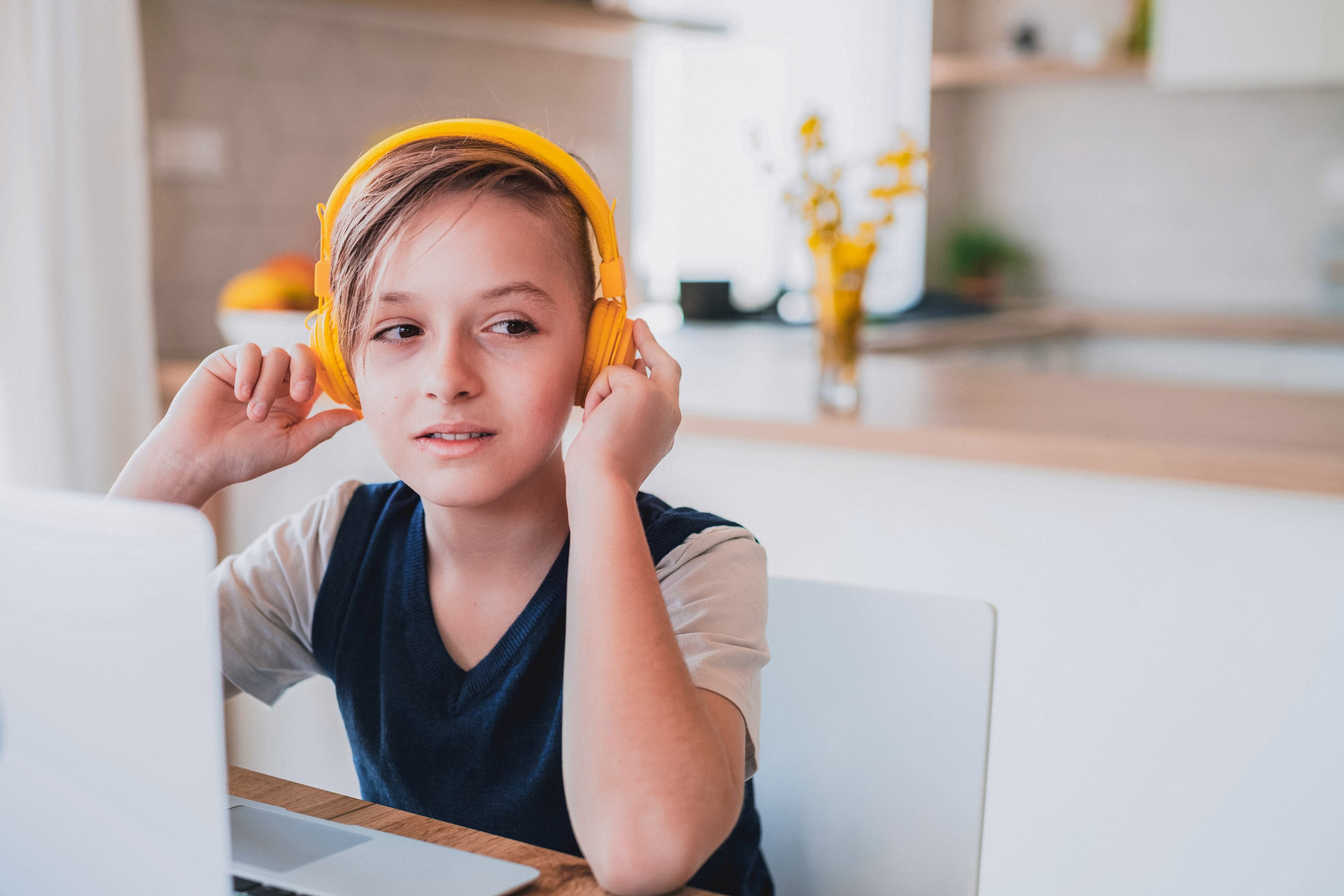
Tips for choosing the right online therapy platform
With so many options, focus on what matters most for your child and family:
Check the therapists’ credentials and experience.
- Make sure providers are licensed and qualified to treat children of your child’s age.
- Ask: “Are your therapists licensed and experienced with kids like mine?” “Can I view therapist bios before matching?”
Understand the therapeutic approach.
- Look for evidence-based care such as CBT, play therapy, or family therapy.
- Ask: “What approaches do you use with children this age?” “Do you involve parents in sessions?”
Consider cost, insurance, and scheduling.
- Check if they accept insurance and whether session times fit your family’s routine.
- Ask: “What insurance plans do you accept?” “How soon can we book an appointment?”
Evaluate platform features and communication style.
- Choose the format your child will actually use (video, chat, or messaging).
- Ask: “What communication options are available?” “Is tech support available if we have issues?”
Verify privacy and security.
- Ensure the platform is HIPAA-compliant and uses secure, encrypted software.
- Ask: “How do you protect privacy and data?” “Are sessions recorded?”
Read reviews and watch for red flags.
- Look for consistent feedback about reliability, therapist quality, and support.
- Ask: “Can we switch therapists if the match isn’t working?” “What’s your policy for cancellations?”
Trust your child’s preference.
- Involve them in the decision. It increases engagement and comfort.
- Ask: “Do you feel comfortable with this format?” “Would you prefer video or chat?”
Start online therapy with Emora Health
Online therapy has made mental health care for kids more accessible than ever, bringing effective, flexible support for your child's mental and emotional health right to your home.
Starting therapy early can change the trajectory of a child’s life. The sooner your child gets the right support, the faster they can rebuild confidence, strengthen coping skills, and reconnect with the joy of simply being a kid
If you’re ready to take that step, consider starting with Emora Health, a trusted, family-centered platform that makes quality care easy to access from home.
You can schedule an intake in minutes and connect with licensed specialists who truly understand children and families. Every session is a small step toward lasting growth, calm, and confidence for your child—and peace of mind for you.

